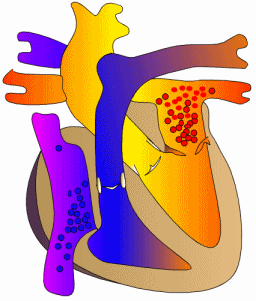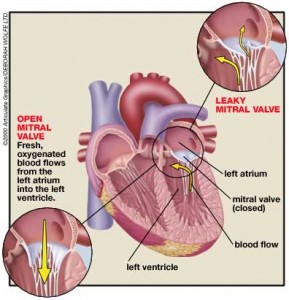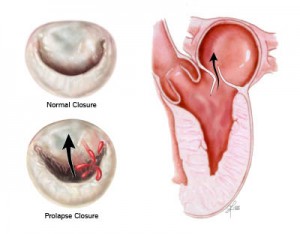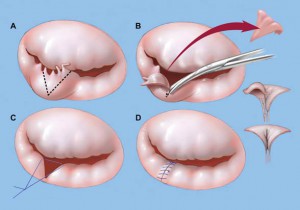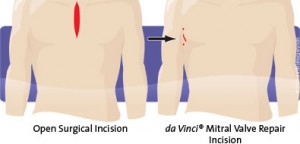Mitral valve prolapse (also known as “click murmur syndrome” and “Barlow’s syndrome”) is the most common heart valve abnormality, affecting five to ten percent of the world population.
Your mitral valve is located between the left atrium and the left ventricle of the heart and has 2 leaflets as well as some attachments to your left ventricle. When the ventricles contract, the mitral valve leaflets close snugly and prevent the backflow of blood from the left ventricle into the left atrium. When the ventricles relax, the valves open to allow oxygenated blood from the lungs to fill the left ventricle.
In patients with mitral valve prolapse, the mitral valve has started to “leak”. When the left ventricle contracts the valve leaflets prolapse (flop backwards) into the left atrium. This usually allows for some leakage of blood back through the valve opening (mitral regurgitation):
When severe, mitral regurgitation can lead to heart failure and new onset palpitations and arrhythmias. Most patients are totally unaware this. Others may experience a number of symptoms discussed below.
Many patients with MVP are tall, thin, with long arms and fingers, and straight backs. It is seen most commonly in women from 20 to 40 years old, but also occurs in men.
Symptoms and Signs of Mitral Valve Prolapse
Most people with MVP have no symptoms, however, those who do commonly complain of symptoms such as fatigue, palpitations, chest pain, anxiety, and migraine headaches.
Sharp chest pains are reported in some patients with MVP, which can be prolonged. Unlike angina, chest pain with mitral valve prolapse rarely occurs during or after exercise, and may not respond to nitroglycerin.
Anxiety, panic attacks, and depression may be associated with MVP. Like fatigue, these symptoms are believed to be related to imbalances of the autonomic nervous system.
Migraine headaches are probably related to abnormal nervous system control of the tension in the blood vessels in the brain.
MVP may be rarely associated with strokes occurring in young patients. These patients appear to have increased blood clotting tendencies due to abnormally sticky blood clotting elements, called platelets.
Examination of the patient reveals characteristic findings unique to mitral valve prolapse. Using a stethoscope, a clicking sound is heard soon after the ventricle begins to contract. This clicking is felt to reflect tightening of the abnormal valve leaflets against the pressure load of the left ventricle. If there is associated leakage (regurgitation) of blood through the abnormal valve opening, a “whooshing” sound (murmur) can be heard immediately following the clicking sound.
Cardiac ECHO is the most useful test for mitral valve prolapse. An Echo can measure the severity of prolapse and the degree of mitral regurgitation.
Palpitations (abnormally rapid or irregular heart rhythms) can occur in patients with MVP. An EKG or a Holter monitor are used to further help examine palpitations.
Most patients with mitral valve prolapse don’t need treatment. Routine examinations including echocardiograms every few years are enough to make sure that the mitral valve leakage has not worsened. If it gets worse, mitral regurgitation may lead to heart failure, heart enlargement, and abnormal rhythms. Therefore, MVP patients with mitral regurgitation are often evaluated annually. Since valve infection is a rare but potentially serious complication of mitral valve prolapse, these patients usually need antibiotics prior to any procedure which can introduce bacteria into the bloodstream. These procedures include routine dental work, minor surgery, colonoscopy, gynecologic, or urologic examinations. Antibiotics used include oral amoxicillin and erythromycin as well as intramuscular or intravenous ampicillin, gentamycin, and vancomycin.
Patients with severe prolapse, abnormal heart rhythms, fainting spells, significant palpitations, chest pain, and anxiety attacks may need treatment.
Beta-blockers, such as atenolol (Tenormin), metoprolol (Lopressor), and propranolol (Inderal), are the drugs of choice. These act by increasing the size of the left ventricle, thereby reducing the degree of prolapse. The calcium blockers verapamil (Calan) and diltiazem (Cardizem) are useful in patients who cannot tolerate beta-blockers.
What are the indications for surgical repair of a leaking mitral valve?
Surgery should be considered when the leak is severe. When a patient with mitral regurgitation develops symptoms, a decreased heart function, or an increase in heart size, surgery is recommended.
What is the chance that a leaky mitral valve can be repaired?
Nearly 100%. The most common cause of mitral regurgitation is a condition called degenerative mitral valve disease—this is also called mitral valve prolapse, myxomatous mitral valve disease, and a floppy mitral valve. Such valves can be repaired (rather than replaced) in more than 95% of patients.
What is the risk of mitral valve surgery?
For asymptomatic patients having mitral valve repair, the operative risk is approximately 1 in 1000. Risk in symptomatic patients remains well under 1%. The presence of coronary artery disease or other conditions that require surgical treatment will affect your individual risk.
What is the durability of a mitral valve repair?
After mitral valve repair, 95% of patients are free of reoperation at 10 years, and this statistic is similar at 20 years. Thus, reoperation is uncommon after a successful mitral valve repair. An echocardiogram is recommended annually to assess valve function. In addition, patients who had valve surgery must take steps to prevent infection and reduce the risk of endocarditis (an infection of the valve).
Why is it important to have my surgery at a center with a large experience in mitral valve repair?
Mitral valve repair is the best option for nearly all patients with a leaking (regurgitant) mitral valve and for many with a narrowed (stenotic) mitral valve.
Compared to valve replacement, mitral valve repair provides better long-term survival, better preservation of heart function, lower risk of complications, and usually avoids the need for long-term use of blood thinners (anticoagulation).
Advantages of Mitral Valve Repair
- Better early and late survival
- Improved lifestyle
- Better preservation of heart function
- Lower risk of stroke and infection (endocarditis)
- No need for blood thinners (anticoagulation)
Mitral valve repair is more challenging than mitral valve replacement, and experienced surgeons are more likely to be able to repair the valve and ensure an excellent outcome.
Although most patients with mitral valve prolapse require no treatment or treatment with oral medications, in very rare cases, surgery (mitral valve repair) may be required. Patients who require surgery usually have severe mitral regurgitation causing worsening heart failure and progressive heart enlargement.
In some specialized heart surgery centers, robotic surgery for MVP is now regularly performed. Not every patient is a candidate and not every surgeon an expert, so ask darefully about your center of choice’s expertise! The advantages if successful are significant however in ease of recovery:

